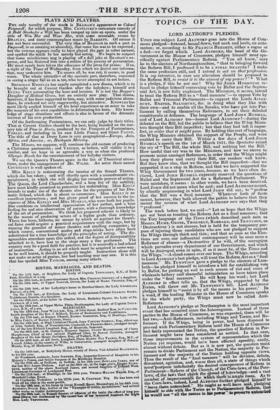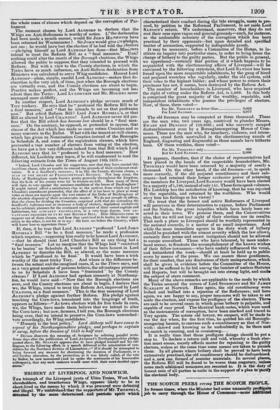- TOPICS OF THE DAY.
LORD ALTHORP'S. PLEDGES.
UPON one, subject Lord, ALTHORP goes into the House of Com- inOnS pledged—fettered, bound down, tied neck and heels, an auto- maton; or, according to Sir FRANC IS BURDEiT, either a rogue or a fool—we forget which. Lord .ALTHORP, the head of the Go- iernment in the .House of Commons, pledges himself most spe- cifically against Parliamentary Reform. " You all know," says he to the electors of Northamptonshire, " that in bringing forward the Reform Bill, ,I :professed it to be X FINAL MEASURE! I make the same profession still, and I intend to act on that profession. It is my intentiOn, in case any alteration should be proposed in the Reform Bill, to resist it to the utmost of my power !"* What is a pledge, if this be not one? Why Sir JOHN HOBHOUSE re- fused to pledge hitnselconcerning vote by Billet and the Septen- nial Act, is now fully explained. The Ministers, it seems, intend to treat. the Reform Bill as a final measure "—to oppose Vote by Ballot and Triennial Parliaments-'—to support the Lords AILES- BURY, EXETER, ..SALISBURY, &C. in doing what they like with their own—and to enable all the Sneaks, who have got into Par- liament by calling themselves Reforniers, to set their deluded constituents at defiance. The language of Lord JOHN 'RUSSELL, -and of Lord ALTHORP too—honest Lord ALTHORP !—during the debated on the Bill, led the public to believe that the Whig:Minis- ters thought their Bill imperfect; but that they had left it imper- fect, in order that it might pass. By holding this sort of language, the Whig Ministry obtained the support of the People, and were enabled to carry their Bill. Within a few days of Lord JOHN RUSSELL'S speech on the 1st of March- 1831, the Spectator raised the cry of " The Bill, the whole Billrand nothing but the Bill." How useful that cry was to the Ministers, and how we strove to promote union amongst Reformers, in order that the Whigs might keep their places and carry their Bill, our -readers well know. But they know also, that we thought the Bill imperfect—that we supported it as a step in -Reform, and that we have supported the Whig Government for two years, because, as we have often de- Oared, Lord JOHN RUSSELL expressly reserved the questions of Ballot and the Septennial Act for a Reformed Parliament. We were mistaken, it seems : in other words, we have been deceived. Lord :Iowa did not mean what he said; and Lord ALTEroneiareant, by silently acquiescing in what Lord JOHN did say, to "profess that the Bill was a final measure."_ Whatever both of thefn meant, however, they both allowed the public to believe that they meant .the reverse of what Lord ALTHORP now says that they " professed." The week before last, we said—" Let us hope that the Whigs are not bent on treating the Reform Act as a final measure; that the Tory language of the Times (which described..such men. as Messrs. HUME, GROTE, THORNELY; BARRAGE, and TENNYSON, as Destructives ') is not sincere, but is held for the temporary pur- pose of injuring those candidates who are not pledged to support the Whigs through thick and thin; and that as soon as the Elec- tions are over, our influential contemporary will be once more a Reforiner of abuses—a Destructive if he will,,.ofthe corruption which pervades every department of our-Government,, and which will be destroyed, even in spite, if so it must he, of the Times and the Whigs."—A cloud comes over our hope.. TheWhigs, according to Lord ALTHORP'S last pledge, will treat the Reform Act as n "final measure." Mr. TrrmYsow gave, a pledge to the electors of Lam- beth—he pledged himself to introduce a bill for establishing vote by,Ballot, for putting an end to such scenes of riot and cases of wholesale bribery and' shameful intimidation as have taken place under the "final measure." He will keep his word; but • Lord ALTHORP in effect tells us, that the Whigs, supported by the Tories, will throw Out Mr. TENNYSON'S bill. Lord ALTHORP pledges himself to "resist it by all the means in his power.' In a -word, if the leading Minister in the House of Commons speaks for the whole party, the Whigs must now be called Anti- Reformers. Lord ALTHORP'S pledge at Northampton is the most important event that has occurred since.the-Interregnum. Instead of three partiesin the House of Commons, as was-.expected; there will be but two,--n-Anti-Reformers, including Whigs and.Tories, and Re- formers. If the Whigs, being in power, had been • disposed to proceed with Parliamentary Reform until the House of Commons had fairly represented the Nation, the question of Reform in Par- liament might • have been considered as settled, ..In that -case, those improvements in the system of representation which the Nation yet requires, would hare been effected speedily, -easily, almost without debate. But as it is now put, the question must remain to divide. Parliament and the Nation; the majority. in Par- liament and the. majority of the Nation holding opposite views. Thus the result of the " final measure ”• will be division, debate, discontent, agitation, and, worse than all,'a state of things which 'imisttostpone °indefinitely the desired consequences of Reform in Parliament=Reform of the Church, of the Cben-laws; of the Poor- laws' of the laws that 'cheek the Spread of kdowledgend a Vast number ,of unprovemen4 for Oleh there mample room.. As to the Corn-laws, indeed, Leal ALTHQRP further pledged hinaSelf to "leave them. untoucyed." He might as well.have. said, piOging -himself to side .wittv.the Tories os to Parlignientary Reform, that he would use " all the Means in lac power- torrent) wits/Wad the whole mass of abuses 'which depend on tshe corruption of Par- liament.
The ,moment chosen .by . Lord ALTHORP to 'declare that the . Whigs are AntisReformers-is worthy of notice. L'the declaration
liadbeen made a month sooner, would Sir JIDIIN HO3ROUSE have been returned for Westminster ? SirJoHst would give iSopledges, not one ; he would have lost ,the, election if he had told the ;sleet:its
himself as Lord ALTHoR.P.has done-sthat MiniNers 'intend to ,treat the Reform. Bill..as a " final measure." Until nothing could alter the result of the Borough elections, the Whigs , allowed the public to suppose, that they intended to proceed with Reform. But with a view to the. County elections, in which the Tories ,have so much influence; an Anti-Reform declaration from Ministers \mi_ calCulated to serve Whigeandidates. Honest Lord ..ALTHORP—plaii,- simple, candid Lord ALTHORP—makes that de- claration in the very nick, of time, just when the Borough elections are virtually over, and. the . County elections are about to begin. . Practice malses perfect, and the Whigs are becoming not less adroit than the Tories: Lord LYNDHURST and Mr. HOLSIES never managed more skilftilly. In another respect, Lord ALTEIORP'S pledge savours much of 'Tory trickery. He says that he " professed the Reform Bill to be a final measure," . and " that he intends to act on that profession . now." But which Wenn. Bill? Lord Jouss RUSSELL s, or that .Bill as altered by LOrd CHANnos? LordALTHORP never did pro- fess that the Bill which has become law should be a "final Imes.- sure." On the contrary, he opposed, or pretended to oppose, that clause of the Act which has made so many rotten Counties and so many converts to the Ballot. What with the tenant-at-will clause, which has.given us. Nomination Counties instead of the Boroughs in Schedule A, and some of the registration clauses, which have preventeda vast . number .4 electors from voting at the election, we have got a law very different. indeed from that Bill which Lord ALTHORP says. that, he " professed to be a final measure." How different, his Lordship may learn, if he will condescend to read the following extracts.from the. Times of August 19tli 1831— "Indeed, Lord Chandos and his supporters, now that they have.carried this insidious clause, take no trouble to conceal the grounds of their exuberant exul- • tation. It is a landlord's measure; it is, like the County7division clause, STAB IN THE HEART OF PARLIAMENTARY REFORM. ' Not long since, the Duke of Buckingham made known pretty generally throughout the kingdom, that the bilk of his estates were let to tenants-at-will. How many of them will dare, to vote against the nominee candidate of the house of Buckingham ? 'It might indeed afford a satisfactory, clue to the motives from which.my Lord • Chandos's amendMent Proceeded, that the effect of it has been to place as many votes as there are tenants upon the vast estates of the Duke of Buckingham at :the absolute disposal of then' aristocratic master. We' o not scruple to affirm, that the clause for dividing the Counties, conjoined with that for ewtending. the landlord's influenceVver so immense a body of electors, dependent exclusively on his arbitrary. pleasure for the continued enjoyment of their vested capitals and 'habitations, has ACTUALLY FRUSTRATED, in a very large degree, THE AD- VANTAGES raomisun To US BY THE REFORM BILL. How fihnisters came to support one of those clauses, and how they contrived to be beaten in their oppo- sition to the other, is not for us to say : the facts are before the Country, which -will know how to appreciate them."
If, then, it be true that Lord ALTHORP "professed" Lord JOHN tRUSSELL'S Bill "to be a final measure," he made a profession 'which requires;--supposing him really to be honest Lord ALTHORP, —that he should treat Lord Chandos's Bill as any thing but a "final measure." Let us imagine that the Whigs had " contrived to be beaten" on Schedule A, would it have been honest in Lord ALTHORP to 'describe' the Bill, so altered, as the same measure which he ."professed..to be final." It would- have been a trick worthy of the most tricky Tory. And where is the difference be- tween, the actual and the imagined cases, if, as the Times says, and .as ,a very great number of. persons-believe, the advantages promised to us by Schedule A have been " frustrated"- by the County clauses? If Lord ALTHORP had spoken sincerely at Northamp- ton, he would have .said—" Now that the Borough elections are over, and the.County elections. are about. to begin, I declare that we, the Whigs, intend to treat the Reform Act, improved by Lord CHANDOS, as a final measure." This is the true meaning of Lord ALTHORP'S. pledge against further 'Reform: His pledge against touching the Corn-laws, translated into 'the-language of truth, appears as' follows." As town eleCtors Wish for free trade in corn, We, the Whigs,' have made them believe that we intend to alter The Corn-laws ; but now, farmers, Itell you,. the Borough elections being over, that we intend to preserve the Corn-laws untouched :
vote accordingly, for Whig candidates." .
"Honesty is. the best Toney." Lord Althorp will have cause to repent of km .NOrthamptonshire pledge, and perhaps to ,explain
it away, before the Session of 1833 is half over. . . .
*` Divines illustrate the meaning. of,. Scripture by . collating parallel. texts. Some days after the publication of Lord 4.x.rucnies..Northatoptonshire pledge,• quoted above, Mr.' STANLEY appears also to • haVe pledged himself and his cot- leagues; to the'follOwing effecton a speech deliverecl at the not:nitration Of can- didates for the Northern division of Laiicashire-r-'.' If if should .beattempted to bring forward any measure for shortening the duration of Parliament, or a still further alteration, by the protection, as it was falsely called, of the vote hyl3allot,lie now announced (and -he spoke the sentiments Of his honourable colleagues), that any such measure 'would- meet with their most decidedloppo- ertion, '



























 Previous page
Previous page